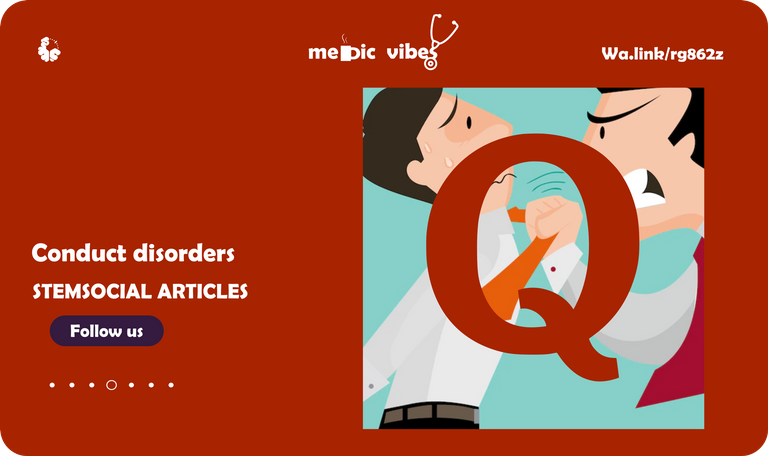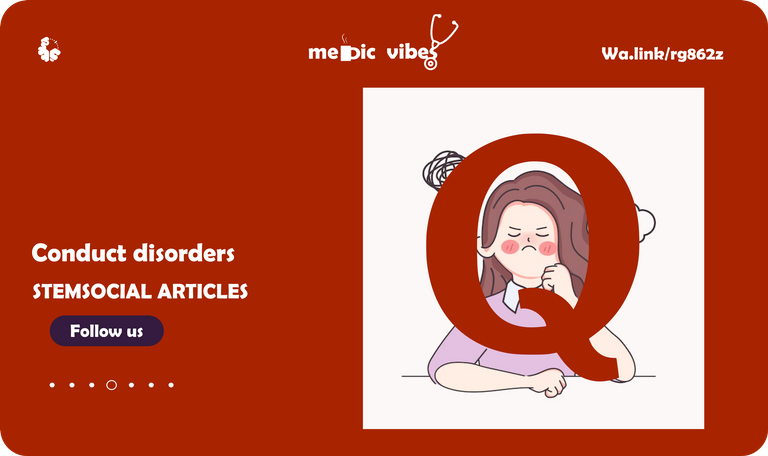
What is the difference between conduct disorder and reactive attachment disorder?
In the last post, we saw how:
- Internet addiction disorder's prevalence varies by culture and traits.
- Conduct disorder is not curable, but early intervention and treatment can prevent recurrence and improve outcome.
- CBT is common treatment for Internet addiction disorder, research ongoing.
Welcome to Medic Vibes, where we discuss mental health disorders and make sense of them. Dr Ebingo Kigigha is a medical doctor (aspiring psychiatrist) and creative person (illustration and music). This has been our routine for four consecutive months. This month will be dedicated to Conduct disorder. In the first month, we discussed Depression, and in the subsequent month, anxiety. We just finished with Eating disorders.
In this post, we are looking at Tik Tok. To learn more just keep scrolling down. You can also skip to the key point of the post if you which or go to the conclusion to get the summary.

Pathological gambling, also known as compulsive gambling, is a serious mental health disorder that is characterized by a persistent and uncontrollable urge to gamble. People with this disorder will often gamble away their savings, relationships, and even their jobs in pursuit of the thrill of gambling.
Compulsive gambling is characterized by an uncontrollable urge to gamble, leading individuals to gamble away their savings, relationships, and even jobs. Symptoms include preoccupation with gambling, a need to gamble with increasing amounts of money, and a lack of control over when to stop gambling.
People may also experience feelings of guilt, depression, and anxiety as a result of their gambling habits. This disorder can have serious consequences for individuals and their families, leading to financial ruin, legal problems, and even suicide.
What is known about the epidemiology of pathological gambling is that the prevalence of the disorder varies depending on the population and the criteria used to define it. According to the National Council on Problem Gambling, the estimated prevalence of pathological gambling in the United States says it is between 1-3%.
Studies also say that men are more likely to develop pathological gambling than women, and the disorder is more common among young adults and those with a family history of gambling or other behavioral addictions.
Research also says that there may be a relationship between pathological gambling and other mental health disorders such as depression, anxiety, and substance abuse. Studies have shown that individuals with pathological gambling are more likely to have co-occurring mental health disorders than those without the disorder.
Pathological gambling can have serious consequences for individuals, families, and society as a whole. What is known is that it can lead to financial ruin, legal problems, and even suicide. The disorder can also have a negative impact on relationships and may lead to problems at work or school.
The cost of pathological gambling to society is estimated to be in the billions of dollars each year, due to factors such as lost productivity, increased healthcare costs, and criminal justice expenses.

Conduct Disorder and Reactive Attachment Disorder(Reaction)

Image by Freepik
Danny Southard who is a Clinical Social worker for the Court system said Conduct disorder is a problem that some kids and teens have. It means they do things like run away from home, steal, break rules, use drugs, and hurt other people's feelings or rights. Reactive attachment disorder is when a child doesn't bond with anyone when they're very young.
This makes it hard for them to trust people and make friends later on. It's like a plant that doesn't get enough water and sunlight in the beginning, it will have a hard time growing strong and healthy. Not all kids with reactive attachment disorder become antisocial, but some might.
According to research, conduct disorder and reactive attachment disorder are two separate conditions that can affect children and teens. Both disorders can lead to difficulties in social interactions and relationships, but they have distinct causes and symptoms.
Conduct disorder is characterized by a pattern of behaviors that violate the rights of others and go against societal norms. These behaviors include things such as aggression, theft, and vandalism. Children with conduct disorder may have difficulty following rules and may struggle to conform to societal expectations.
Reactive attachment disorder (RAD) is a rare but serious condition that occurs in children who have experienced severe disruptions in their early caregiving experiences. Children with RAD may have difficulty forming healthy attachments and relationships with others, and may have difficulty trusting people. They may also have difficulty with emotional regulation, expressing their emotions and may also have a lack of emotions.
Children with RAD may have difficulty responding to comfort and may not seek comfort when they are upset or distressed. They may also be indifferent to caregiving, or may be excessively clingy and demanding. They may also display social and emotional withdrawal, and may not respond positively to social interactions and may even display aggressive behavior.
Conduct disorder and reactive attachment disorder can have some similarities in terms of the difficulties that children and teens with these conditions may experience. Both disorders can lead to difficulties in social interactions and relationships, and both may require specialized treatment and support. However, conduct disorder is primarily characterized by externalizing behaviors, whereas reactive attachment disorder is primarily characterized by internalizing behaviors.
Externalizing behavior is when a child acts out, such as through aggression or rule-breaking. Internalizing behavior is when a child withdraws or has emotional difficulties, such as anxiety or depression.

Treatment for pathological gambling
Treatment for pathological gambling typically involves a combination of therapy and medication. One of the most effective forms of therapy for pathological gambling is cognitive-behavioral therapy (CBT). This type of therapy helps individuals to identify and change negative thought patterns and behaviors related to gambling. It also teaches coping mechanisms and stress management techniques to help individuals resist the urge to gamble.
Medications such as antidepressants and anti-anxiety medication may also be used to help reduce symptoms of pathological gambling. These medications can help to alleviate feelings of depression and anxiety, which are commonly associated with the disorder.
Another approach is to provide support groups for people with gambling disorder, where individuals can share their experiences and receive support from others who are also struggling with the disorder. These groups can provide a sense of community and belonging, which can be beneficial for individuals with pathological gambling.
It's important to note that treatment for pathological gambling should be tailored to the individual's specific needs, and may involve a combination of different therapies and medications. It's also important to seek professional help as early as possible to prevent the disorder from getting worse and to improve the chances of recovery.
Questions
- What did you learn about Conduct disorders?
Conclusion
- Pathological gambling is a serious mental disorder where the person has an uncontrollable desire to gamble.
- Conduct disorder and Reactive Attachment Disorder can lead to social difficulties, characterized by externalizing and internalizing behaviors respectively, require specialized treatment.
- Treatment for pathological gambling treatment includes medication, CBT, support groups.

References
Page demarcations made with Inkscape.org

